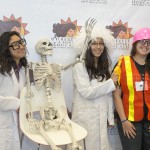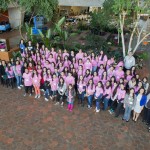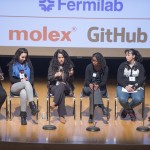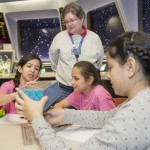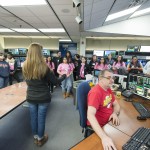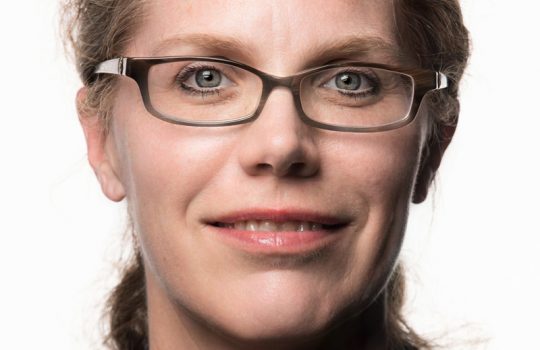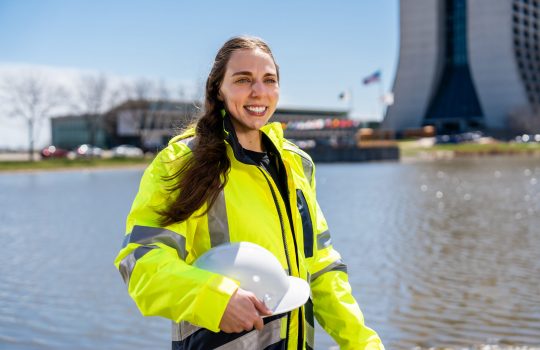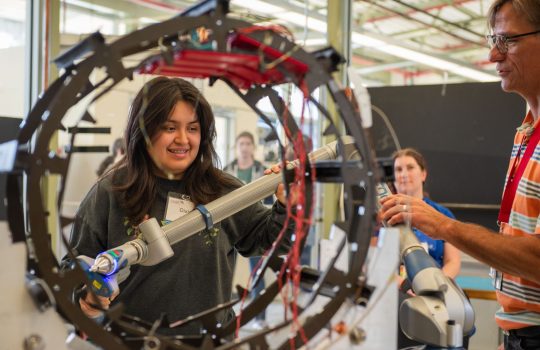Since the creation of the White House Initiative on Educational Excellence for Hispanics in 1990, several local and national organizations have popped up to help fund and support young Hispanics and Latinos. According to the 2015 U.S. Department of Education’s Latinas in the U.S. report, one in five women in the country is Latina. Graduation rates from high school and college have increased for the Latino population, and Latinas earn nearly 60 percent of bachelor’s degrees earned by this group.
Despite the growing success, a problem persists for these women in the fields of science, technology, engineering and mathematics, or STEM. The report noted that only 17 percent of Latinas received a STEM degree, the lowest of females in all ethnic groups.
To help increase Latina participation in STEM, a DuPage County nonprofit organization held its first Latina STEM Conference at Fermilab on April 9. Partnering with the lab, Dare to Dream: Get Educated! hosted the event. Seventy-two middle school girls and their parents attended to listen to Latinas in STEM talk about their careers and demonstrate some of the work they do as STEM professionals.
The free event kicked off with a welcome and panel discussion consisting of five women in STEM in the greater Chicagoland area, three of which are Fermilab scientists. Afterward, half of the girls went on a lab tour while the other half visited the Lederman Science Center for a workshop filled with activities run by a few of the panelists and Fermilab employees. During this time, the parents received a presentation and had a panel discussion on preparing their daughters for high school, as well as college financial aid advice.
“Our goal is to engage young Latinas and get them excited about STEM,” said Carolina Manel, a Dare to Dream volunteer and coordinator, as well as a Web developer for Xeno Media based in Chicago. “Not enough Latinas, and girls in general, are introduced to these subjects properly at a young age, or they feel that they are not wanted. We want to make sure they know they are needed in these fields.”
Fermilab has diversity programs and initiatives to offer opportunities for all people. These events and conferences are another way to locally open the door to people who may not have access to this information elsewhere.
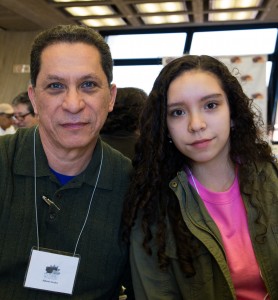
Alberto Avalos and his daughter, Claudia, attended the Latina STEM Conference April 9. The two said they were excited to see the lab and meet other Latinas interested in similar fields of study. Photo: Rashmi Shivni
“This is our first time having a bilingual workshop,” said Griselda Lopez, a coordinator of the STEM conference and Fermilab international services manager. “By using Spanish and English together, we appeal to both the young girls and their parents – some parents don’t speak a word of English.”
Dare to Dream suggested offering some bilingual activities in emphasizing the need for Latinas in STEM so that parents could help direct young girls to study the subjects they are passionate about.
“Students that speak more than one language have an upper hand,” said Alberto Avalos, a father attending the event with his daughter, from Chicago. “My daughter speaks and writes fluently in Spanish and English. She will be very successful no matter what she does.”
In the workplace, having a variety of people with many different backgrounds helps create a comfortable and enriching environment, said Minerba Betancourt, a conference coordinator and a research associate in Fermilab’s Neutrino Division.
“We get to share all kinds of knowledge in all areas, and we are able to conduct huge, meaningful experiments,” she said.
The young Latinas who attended the event seemed to take to heart the messages from Betancourt, Manel and all of the other panelists, speakers and volunteers.
“I’ve never had an experience like this in an actual lab before,” said Claudia Avalos, daughter of Alberto Avalos and a biology enthusiast. “These women taught me to always stay true to your heritage no matter what career you take, because if you forget it, you forget a part of yourself. I love science, but I also like who I am.”

